“Break the boundaries of a limited mind and body. Experience bliss throughout yourself and around yourself. Find yourself in the Ultimate.” I’m beginning to identify with Swami Purna’s reflection.
New Year in Salta cost us several arms and legs. Jason’s fuel pump had given up the ghost, not favourable on our budget but one of those hidden costs we’d simply have to take on the chin and write off. Ruta 51 from Salta kick-started the New Year at the crack of sparrows with a 100-mile ride along Rosario river, fun sections of dirt and asphalt to a rest-stop in San Antonio de los Cobres. We were headed to La Quiaca via an old section of the ruta 40 where the rugged ripio eventually meets the smooth run of ruta 9. An overnight stay in the dusty desert town and two melt-in-your-mouth meals consumed at San Antonio’s Quinoa Real cafe later, gave me the energy to jump straight back on Pearl and tackle the 58 miles of thankless tract, which grew mostly rocks, hand blisters and busted hopes.

Cars bombing through the Dakar’s seventh stage at La Chita, Bolivia


Saying our fond farewells to Argentina, she’ll make and break your heart.

More hairpins than in a woman’s hairdressers
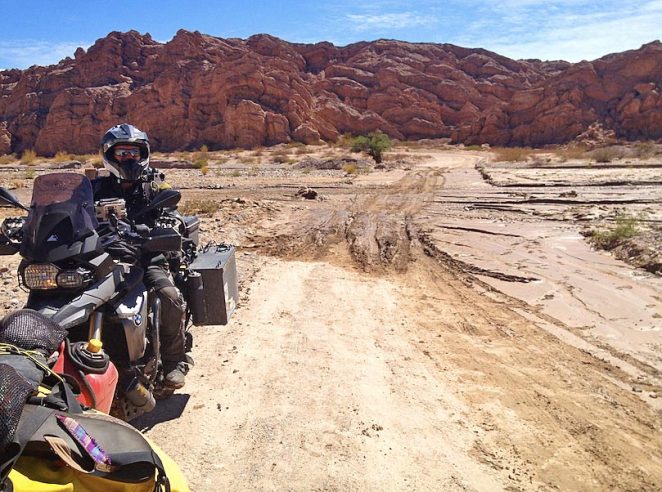
“Keep that gas on, Morris!”
Handling Pearl – leaden like a pack mule at altitude over coarse sandy corrugations – I was asking a lot of her. One of her fork seals was leaking oil, her chain on which I was about to further yank had seen better days and goodness knows how her worn shocks would fare over the jolting bumps. Why did my mood become so capricious on slightly technical terrain, which seemed so inextricably linked to my off-road performance? I’d become rusty was all, my skills and comfort zone out of kilter. Over-caution embedded into the physical rigidity carved into my body gave rise to a basic distrust of sand. I felt a web of small cracks scoring into my mood like the crazing on old china.
Marshalling my energy, I eventually rumbled Pearl into action for the remaining 30-mile section. My muscle memory kicked in half way through the episode making my foray back into off-roading tedious and punishing rather than terrifically tiring. Time was well overdue to relax the antennae I’d raised in fear of hurting myself on sand at speed; I allowed my body to be pumped in the capable hands of Pearl. It took a while but I liked Pearl’s self-possession and her dangerously unknowable edge. We were in agreement, at last, “I am woman, hear me roar, watch me ride.”

Good time to inch the last of the Ketchup out of the bottle over these bad boy corrugations…
Our tyres eventually hit a surface recognizable as roadway, the humming of Pearl’s tyres back on the asphalt lulled me into relaxation. With over 15,000 miles clocked on South American soil, we eased our way back into Bolivia. The land where they give their buses names like Alison and Jesus, a land so high the air escapes you. It’s home to the multicoloured back-wrap, the bowler hat framing long black braids on women as well as riots and street parades erupting without warning. It’s a place of contrast, curiosity and for us, a constant headwind.

After four inefficient hours, we inched our way over Argentina’s La Quiaca border into the bustling southern city of Villazon. If our first encounter of Bolivian traffic was anything to go by, I didn’t hesitate to put Pearl back into survival mode and her most aggressive gear. You won’t faze me this time, road-razzing Bolivian crazies. I ignored the best course through the apex and stuck to the outside white line like glue, cornering every curve like I was on rails. Slower and cautious was preferable to oblivious and unconscious. Jase put me in front to cut down on the ‘dawdling’ to which he’d sardonically refer, hang on, dawdling is one of my favourite pastimes.
On the edge of the country’s altiplano, we found ourselves at over 4,000 metres – occasionally dropping to the oxygen-rich 2,500 metres. The air was thinner, the drivers less than considerate and the llamas unperturbed by our motorcycles’ roar. I was growing re-accustomed to the new daily grind, the rise and fall of this unpredictable country. I wondered if this time round, we’d find its hidden depths.
Deep in the bowels of Potosi: The silver city that once was. Founded in 1545, soon after the Spanish stumbled across the Cerro Rico – Rich Hill – looming over the city. This mountain harvested enough silver to bankroll the mines. As our bikes rattled down cobblestones and through the crowded streets of a late afternoon, local drivers must have pipped at me more times than I’d had hot dinners. Horns hooted constantly at me in that city-based passionless way – nothing personal, just a reflex action. It was simply the way of it here; if you don’t push your way into traffic with purpose, no one will let you in.
Our second sojourn in the city left me seeing the same – Potosi was riddled with filth, the destitute weathered by hardship, scraped a living amidst the traffic and the slums clustered around firearm-guarded banks. An unmistakable undertone of its sad stories, past and present. Seeing the odd toddler wrapped up in llama wool to keep in their little body’s worth of warmth, jangling key rings gone 10pm at night plucked at something very deep in me.

The altogether rather splendid central plaza, Sucre
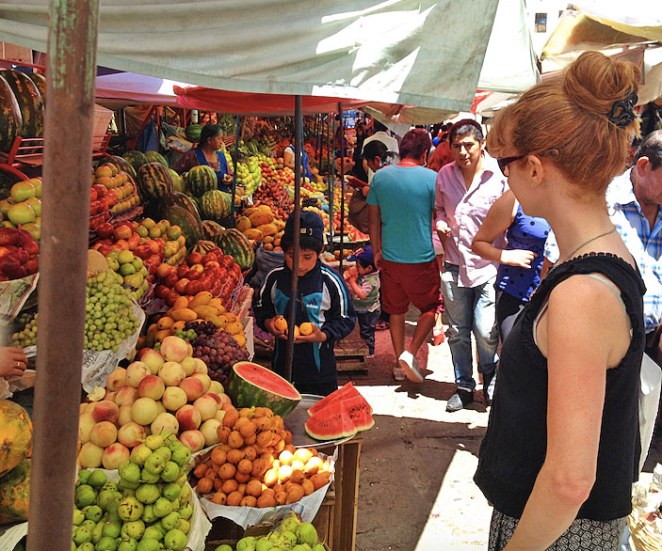
Wahey, time to stock up on our ‘five a day’ here Jase.
Sucre, just a scant 100 miles northeast of Potosi saw us savour some sugar at Café Florin; a three-course meal for an economico 35 Bolivianos would be less than £3.50. It was mouthwatering to boot. A first-floor apartment catering to all the needs of a modern motorcycle traveler also had us blinking in shock when we rocked up a few blocks down the road at Hostel Wasi Masi. Arrr, the moment when your faith is restored in budget travel through South America’s most impoverished country. It was altogether sublime. The sky turned from midnight blue to charcoal, and the light from the streetlamps glowed gold in the fine evening mist.

The wonderful Wasi Masi Hostel in Sucre – kindly catering to all the needs of the modern motorcycle traveller on a tight budget. Cracking breakfast included too!
Returning to Potosi, we rode under a leaden sky that was bleak and raw. A torrent of monsoon rain forced us to don the ‘super-suits’: an all-in-one, super-sized, non-breathable black number with ample room leftover for another me. I could quite possibly have been mistaken for someone the size of Belgium. Fashion kudos aside for one moment, surely it’d be in the running to win drysuit-of-the-year for keeping every drop of water, wind and cold at bay. It saved our skins and allowed me to ride with that snug-as-a-bug feeling outside – come rain and hail without shine – somehow reveling in it all.
On arrival, a fierce gale tore through the streets, along the alleyways and across the open spaces of the city; ripping newspapers from unwary hands, seeking out ill-fitting doors and loose window frames, whipping litter to head height and bearing it across the plaza. Outside was the hooting traffic, the cacophony of the street but once through the doors a hush fell, as if the hostel created its own silence. I peered out my window and the place looked eerie at night, bathed in a sodium light.

Uyuni – alive day and night over the Dakar Rally Raid.
Cruising into Uyuni’s intense light the following afternoon, the Dakar rally-inspired carnival and markets bustled in full swing. An excited buzz filled the air as locals, bikers and travellers jostled for space between the stalls packed tightly with street food, mocochinchis – sugar-sweetened, dehydrated peach drinks and an A-Z assortment of Dakar-related memorabilia and merchandise. We pushed the side-stands down to the nearest street vendor, ravenous. Promptly serving up the Menu del Dia – an inexpensive, set meal for the locals – we dived into a steaming bowl of roasted llama on a bed of hot, fluffy quinoa and fortified ourselves for the hours ahead.
Resided to the fact that Uyuni’s accommodation would be four times the standard rates – who could blame the locals for making their moolah over the Dakar rally – we headed straight to the Salar to find out where the daredevils would be blasting through to complete the seventh stage of the race.
The Dakar rally raid is a fortnight long, off-road endurance race. Riders in highly modified cars, trucks, on quads and dirt bikes need Trojan-level stamina and a dogged perseverance to rocket like a bullet across every terrain known to man covering up to 900 kilometres (560 miles) per day. The race kicked off in Buenos Aires on 4 January, headed northwest on a circuitous route into Chile, as far up to Bolivia’s Salar de Uyuni, south through Calama in Chile and diagonally cut back into Argentina to the starting point and finishing line, Buenos Aires.
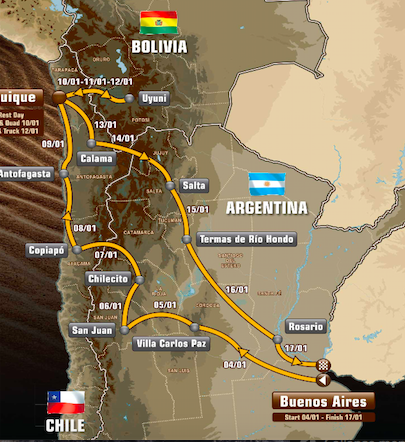
The gruelling 2015 Dakar route!
Punishingly grueling doesn’t remotely cover the intensity of racing in the Dakar. Temperatures of around 50 degrees Celsius were being reported by riders in the desert while sustaining hundreds of miles of dunes, mud, pampas grass, rocks, sand and fesh-fesh (moon dust), dirt, gravel and riverbeds. Serious altitudes and bone-chilling cold on top – the riders will have needed to summon Herculean mental and physical strength to sustain themselves over the 13-day race. My feelings of inadequacy on the sand compared to what the Dakar guys and gals would endure was spectacularly comical. Finishing the race is the ultimate achievement in itself, let alone going like a bat out of hell to win first, second or third place. Rooting for father and son duo Simon and Llewelyn Pavey comprised a big motivation in experiencing part of the Dakar.

Kicking up a storm at the Dakar
With the road en route to Salar de Uyuni still under construction, we were forced to ride in the dirt to reach La Chita. My latest assault on the sand left me feeling very Monday morning-ish. Sensing Jason’s waves of frustration snaking my burdened path, I was beginning to miss both the point and the boat. All I wanted was two-wheeled peace instead of the spirited minefield of my emotions against Jason’s expectations. I didn’t want to give up my confidence or my headspace, to sand, of which would inevitably overwrite it with its own needs, desires and wants. But relationships are fraught with grey areas. It’s not always possible to do what, in other circumstances, one would feel is the right thing.
Furrows of concern formed between my eyebrows, I was starting to feel like a country song, “There’s something wrong about not feeling right.” I sensed a tectonic shift between the correct conduct on the sand and my current riding behaviours. Now I was caught up in a triangular turmoil and, like the delayed wash from a passing liner, the swell of tension between Jason, the sand and me was rocking my own comfortable boat.

In a Bolivian army sarnie!
Positively pushing me on, I straggled behind Jason until we reached Colchani. In fact, I hadn’t realized at the time but I’d ridden the briefest section of the Dakar race! Go me. Seconds before each patch of sand, the words ‘Keep the gas on’ with a gulp surged into my mind and left my insides turning to jelly. “Oh come on Lisa, it wouldn’t be so bad if I knew you couldn’t do it. But I know you’ve proved time and time again – you CAN DO IT.” I felt sympathetic towards Jason’s ongoing patience but his words still elicited the same response from me. Slowly, slowly, catch a monkey!
The ruddy sand threw me into a constant state of flux; it was the agony of acknowledging what I should be doing on the sand, along with the pain that neither logic nor understanding could dispel. I was disintegrating in a welter of waning confidence and collapsing morale. I was starting to disconnect with Jason and put up a protective shield. The trouble was, the more I neglected to adopt a ‘Get on with and go for it’ mantra, I watched myself becoming more whiny and resentful; I was becoming hateful to myself. This vicious circle was creating a lack of affectionate ease and companionship between us – taken for granted usually – that I so badly craved.

Jason stood next to Ricardo, chance meeting him and his gang by the roadside en route to La Chita – thanks for the beer!
En route to La Chita, we bumped into a gregarious band of Bolivian bikers. Ricardo introduced us, exuded a gentle bonhomie and told me he’d be leaving his motorcycle behind, apparently didn’t like handling it in sand. I hear you fella, I hear ya. Beer can thrust in my hand, these guys were having a ball on their lad’s weekend jaunt. I took a long pull of the chilled welcoming nectar and smacked my lips. That should loosen me up.

Standing next to Victor on the right; clueless as to what he had in store for me! (Suffering from ‘brolly envy’ too!)
Rapidly becoming jaded with ruminating on my own incompetence tinged with an erratic riding style, I fixed my eyes on the middle distance and opened Pearl up. “Vamos, lets go Lisa!” she roared. I flicked the switch inside my head and felt like a pit pony loosed into the sunshine. Anything was possible, despite being a little tense and ready for battle. But after the 26 sandy miles to La Chita, nothing eventuated. I was still in one piece. Now there was a large and beautiful logic. I’d done it, albeit with a lacking equanimity. May be what happened was a portent, a warning to me that I MUST get over myself, out of my own stereotype and the cringe-worthy, reticent rider I didn’t want to be.

Hanging with Ricardo on the roof of his 4×4, putting the world to rights while surveying the Dakar scene at La Chita, Bolivia.
The Bolivian guys took us into the fold, set up camp at La Chita and used a lorry truck and several Bolivian flag posts to assemble a square tape-bound section of our own turf. A generator, sub-woofers, a big barbeque grill and crates upon crates of beer were unloaded while we looked around, our faces in a rictus grin. We were with these locals to experience the Dakar, only by chance. Waves of people started appearing, a sea of tents popped up around us and the official organizers among troops of soldiers made their nebulous presence. It took me a while to realise they were there at all.
An onslaught of curiosity ensued, our wheels magnetized in the masses – subjected to an afternoon of photo-snapping, trigger-happy paparazzi. We’d been welcomed in by hordes of Bolivians and it felt wonderful. China-blue sky darkened to navy and the sun rested, a crimson orb on the horizon, turning the clouds through gold and orange to deep rose and purple.
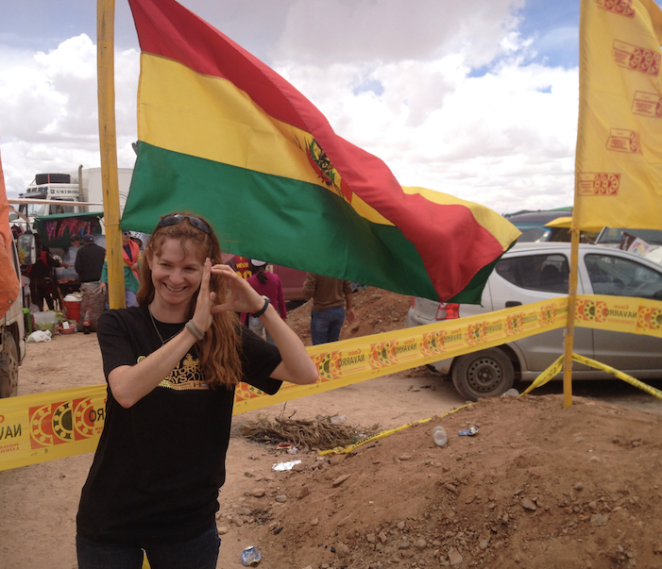
No prizes for guessing what the ‘D’ stands for…
Victor, one of the guys in the group approached me with a glint in his eye and a bottle of unknown substance in hand. I took a sip of the potent concoction, which burned all the way to my toes. The next thing I know, he grabbed my hand and a fast and spirited salsa began. I was in my element, dancing with a newly acquainted partner – in this case a Bolivian chap whose feet stirred a rustle of delight in our audience as he swept me along to the rhythm of the music, hurling me mercilessly to the end of the song. Victor, the music, the place – it all infected me, lifting me out of myself, any inhibitions and into the spirit of the dance. Victor was thrilled I’d committed, kissed my cheek and forewarned me I’d be in for another with him shortly. I coquettishly raised my eyebrows and Victor gave me a conspiratorial wink. Smiling, I tried to discreetly burp as the beer and barbeque tangoed noisily and decided that another swig might fix it. What is it about salsa that gets you out of your head and into your body, making seeing everything more clearly.
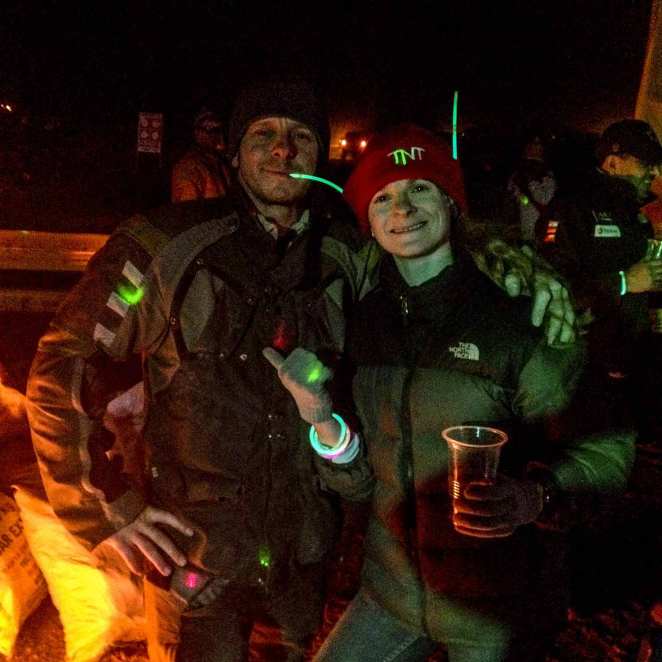
Getting quietly sloshed to some blaring Bolivian tunes with a lively band of locals. Whose alien hand is that crawling on my shoulder?!
After the last dance somewhere in the wee hours, I bowed my head with half-closed eyes; I probably resembled a sleeping reptile. A rollercoaster of sand riding, the altitude and salsa’ing all night in cumbersome motorcycle boots brought on an unbeatable urge to inspect the insides of my eyelids. Jason too must have been exhausted as sleep took him before his head hit the pillow. I fell into a deep, undisturbed sleep broken only by an audible realisation that I’ve never known anyone who can fart and snore at the same time. We slept beautifully. Sleep was so simple, especially when one was gazebo’ed!
In a pearly morning light, I emerged slowly from the fug of sleep and quickly remembered the previous evening’s pleasure at the hands and feet of Victor. That guy had the lightness of a panther and the speed of a leopard. Jason rose with the same delight that I’d found someone to play with all evening, in this baffling and beguiling country.
Part two on the Dakar coming soon…think Dakar warriors en motos!
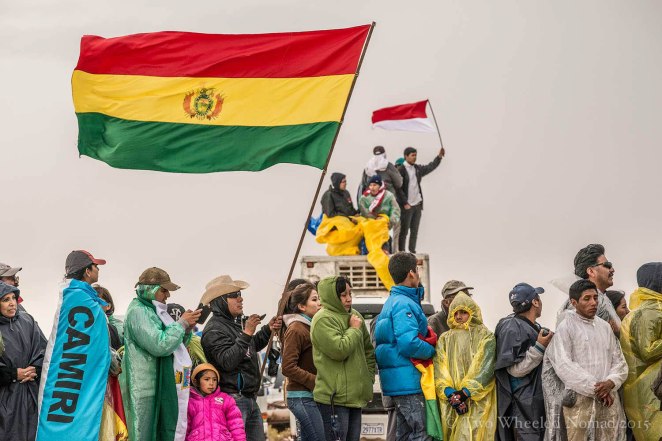
Cheering on the cars under lightning-charged skies at the Dakar

Brilliant stuff!
LikeLike
Cheers James, glad you think so! Ha hah X
LikeLike
Jason, did you just send me a kiss!? That Bolivia is having a strong influence on you mate. haha.
LikeLike
Thanks a bunch for the update! Ride safe and may God go with you! Bob Hunt In God we trust! God intervenes in the affairs of men by invitation only!
LikeLike